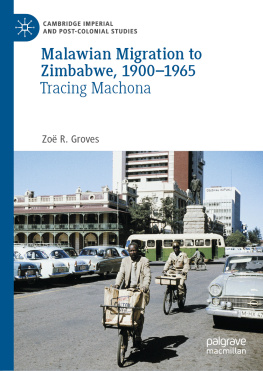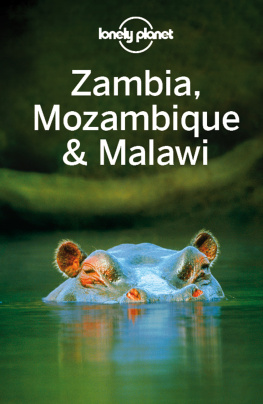Labour and Economic Change in Southern Africa c.19002000
This book explores the social and economic development of Zimbabwe, Zambia and Malawi over the course of the twentieth century.
These three countries have long shared and interconnected pasts. All three were drawn into the British Empire at a similar time and the formation of the ill-fated Federation of Rhodesia and Nyasaland formally linked these countries together for a decade in the mid-twentieth century. This formal political relationship created dynamics that resulted in yet closer economic and social links. After Federation, the economic realities of industry, transport and labour supplies meant that these three countries continued to be intricately interconnected. Yet despite these connected pasts, comparative work on the economic histories of Malawi, Zambia and Zimbabwe, and how these change over time, is rare. This book addresses the gap by providing the first comprehensive collection of labour and census data across the twentieth century for these three countries. The different economic models and performances of these states offer good comparison, allowing researchers to look at different models of development, and how these played out over the long-term.
The book provides data on population growth and change, industrial and occupational structure, and the various shifts in what the economically active population did. It will be useful for historians, economists, development studies scholars and non-governmental organisations working on twentieth-century and contemporary southern Africa.
Rory Pilossof is a historian of southern Africa based at the International Studies Group, University of the Free State, South Africa. His main research interests are the end of empire, labour and land in Zimbabwe and neighbouring countries.
Andrew Cohen is Senior Lecturer in Imperial History at the University of Kent, UK. He also holds a visiting research fellowship at the International Studies Group, University of the Free State, South Africa. His research interests include the economic history of southern Africa in the twentieth century.
Routledge Studies in Modern History
Atlantic Crossroads
Webs of Migration, Culture and Politics between Europe, Africa, and the Americas, 18002020
Jos Moya
Food History
A Feast of the Senses in Europe, 1750 to the Present
Edited by Sylvie Vabre, Martin Bruegel and Peter J. Atkins
Labour and Economic Change in Southern Africa c.19002000
Zimbabwe, Zambia and Malawi
Rory Pilossof and Andrew Cohen
Engaging with Historical Traumas
Experiential Learning and Pedagogies of Resilience
Edited by Nena Monik, Ger Duijzings, Hanna Meretoja, and Bonface Njeresa Beti
Sun Yatsen, Robert Wilcox and Their Failed Revolutions, Honolulu and Canton 1895
Dynamite on the Tropic of Cancer
Patrick Anderson
Histories of Surveillance from Antiquity to the Digital Era
The Eyes and Ears of Power
Edited by Andreas Marklund and Laura Skouvig
For more information about this series, please visit: https://www.routledge.com/Routledge-Studies-in-Modern-History/book-series/MODHIST
First published 2021
by Routledge
2 Park Square, Milton Park, Abingdon, Oxon OX14 4RN
and by Routledge
605 Third Avenue, New York, NY 10158
Routledge is an imprint of the Taylor & Francis Group, an informa business
2021 Rory Pilossof and Andrew Cohen
The right of Rory Pilossof and Andrew Cohen to be identified as authors of this work has been asserted by them in accordance with sections 77 and 78 of the Copyright, Designs and Patents Act 1988.
All rights reserved. No part of this book may be reprinted or reproduced or utilised in any form or by any electronic, mechanical, or other means, now known or hereafter invented, including photocopying and recording, or in any information storage or retrieval system, without permission in writing from the publishers.
Trademark notice: Product or corporate names may be trademarks or registered trademarks, and are used only for identification and explanation without intent to infringe.
British Library Cataloguing-in-Publication Data
A catalogue record for this book is available from the British Library
Library of Congress Cataloging-in-Publication Data
A catalog record has been requested for this book
ISBN: 978-0-367-46776-0 (hbk)
ISBN: 978-1-032-01270-4 (pbk)
ISBN: 978-1-003-03425-4 (ebk)
Typeset in Times New Roman
by codeMantra
Introduction
labour and economic change in Southern Africa c.19002000: Zimbabwe, Zambia and Malawi
Rory Pilossof and Andrew Cohen
Introduction
Southern Africas political, social and economic development was fundamentally shaped by processes of colonisation and new forms of economic activity that arose from that intrusion. The large-scale exploitation of mineral resources in the late nineteenth century and the entrenchment of European colonialism across the region reshaped African societies and changed the nature of how, and why, people worked. In the countries that constituted the former Federation of Rhodesia and Nyasaland (Zimbabwe, Zambia and Malawi), these processes played out in particular and diverse ways. Broadly speaking, the push of taxes was combined with the pull of wages in new mines, farms and factories across the region that slowly coaxed Africans into the capitalist economy. The growing urban centres, and the work in the new establishments and households, provided alternatives to mines and farm work, as well as providing opportunities for livelihoods based on informal work catering for the needs and desires of urban residents. The development of all three countries after independence was fundamentally shaped by these experiences of colonialism and this book seeks to place labour and economic change following independence in the context of the unequal positions these countries found themselves in upon independence.
The economic bedrock of each of the three countries examined in this book became established in this period after the Second World War and before the processes of decolonisation that gathered pace in the 1960s. Malawi has long been seen as a peasant farming economy and labour reserve for the region. With almost no mining or manufacturing at all to speak of, and a relatively small commercial farming sector, many Malawian workers migrated to find wages on the mines and farms in the region, but particularly in South Africa and Zimbabwe. Commercial farming established itself as the cornerstone of the Zimbabwean economy after the Second World War, particularly due to the growing success of large-scale tobacco farming. However, in addition internal developments, colonial Zimbabwe had to contend with the pressures of international sanctions following the unilateral declaration of independence by a white-minority settler regime in November 1965. Consequently, by the time the country gained independence under majority rule in 1980 Zimbabwe had significantly diversified its economy. It was the second most industrialised country on the continent, after South Africa. Zambia, on the other hand, had a very different economy, as it was primarily dependent on its mining base. Copper production, and impressive rates of urbanisation, radically changed Zambias economic fortunes from the 1950s to the 1970s.
After independence, there were continuities and changes, challenges and successes in the economic performance and make up of each of these countries. Each country, however, struggled with economic downturn in the 1980s and 1990s, which, in turn, had dramatic changes on the work and livelihoods of the economically active populations. New forms of work and Yet, despite the depth and value of much of this work, there have been few attempts to examine the long-term change in occupational structures in these countries. Changes in population, working life and the occupational structure over the course of the twentieth century still need more clarification. Especially in the earlier parts of the century, record keeping was patchy, and many sections of the population were not counted. This book seeks to shed light on how we understand the entire working population and what occupations they were involved in and how this changed over the course of the twentieth century. We will explore how occupations shifted over time and how the political and economic context in the three countries (and the region) impacted on the working lives of the regions populations.







